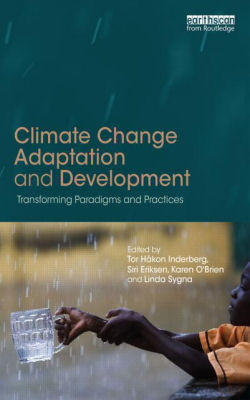Climate Change Adaptation and Development: Changing Paradigms and Practices

Climate change is as much a problem of development as for development, according to a new book on climate change adaptation and development.
Climate change poses multiple challenges to development. It affects lives and livelihoods, infrastructure and institutions, as well as beliefs, cultures and identities. There is a growing recognition that the social dimensions of vulnerability and adaptation now need to move to the forefront of development policies and practices.
A new book co-edited by FNI Senior Research Fellow Tor Håkon Inderberg presents case studies showing that climate change is as much a problem of development as for development, with many of the risks closely linked to past, present and future development pathways.
Development policies and practices can play a key role in addressing climate change, but it is critical to question to what extent such actions and interventions reproduce, rather than address, the social and political structures and development pathways driving vulnerability. The chapters in the book emphasise that adaptation is about much more than a set of projects or interventions to reduce specific impacts of climate change; it is about living with change while also transforming the processes that contribute to vulnerability in the first place.
Key question posed in the book are:
- To what extent are development and aid interventions contributing to, or countering, current development pathways that are based on fossil-fuel-driven economic growth?
- Are adaptation measures merely incremental adjustments to ‘development as usual’, or can they influence current development pathways in ways that bring about fundamental transformations and paradigm shifts?
Chapters:
1. Development as Usual is not Enough
Siri Eriksen, Tor Håkon Inderberg, Karen O’Brien and Linda Sygna
2. Building Adaptive Capacity in the Informal Settlements of Maputo: Lessons for Development from a Resilience Perspective
Jon Ensor, Emily Boyd, Sirrku Juhola, and Castan Broto
3. The Societal Role of Charcoal Production in Climate Change Adaptation of the Arid and Semi-Arid Lands (ASALs) of Kenya
Caroline Ochieng, Sirkku Juhola, and Francis X. Johnson
4. Adaptive Capacity: From coping to sustainable transformation
Christine Wamsler and Ebba Brink
5. Gender Matters: Adaptive capacities to climate variability and change in the Lake Victoria Basin
Sara Gabrielsson
6. Adaptation Technologies as Drivers of Social Development
Sara Trærup and Lars Christiansen
7. Multilevel Governance and Coproduction in Urban Flood-risk Management: The case of Dar es Salaam
Trond Vedeld, Wilbard Kombe, Clara Kweka Msale, and Siri Bjerkreim Hellevik
8. Can Linking Small- and Large-scale Farmers Enhance Adaptive Capacity? Evidence from Tanzania’s Southern Agricultural Growth Corridor
Jennifer West
9. Adaptation Spinoffs from Technological and Socio-economic Changes
Julie Wilk, Mattias Hjerpe and Birgitte Rydhagen
10. Sustainable Adaptation under Adverse Development? Lessons from Ethiopia
Siri H. Eriksen and Andrei Marin
11. The Role of Local Power Relations in the Vulnerability of Households to Climate Change in Humla, Nepal
Sigrid Nagoda and Siri H. Eriksen
12. A Socionature Approach to Adaptation: Political transition, intersectionality, and climate change programmes in Nepal
Andrea Nightingale
13. Influencing Policy and Action on Climate Change Adaptation: Strategic stakeholder engagement in the agricultural sector in Tanzania
Kassim Kulindwa and Baruani Mshale
14. Limited Room for Manoeuvre: Indigenous Peoples and Climate Change Adaptation Strategies
Jacob Kronik and Jennifer Hays
15. Adaptation to Climate Change through Transformation
Karen O’Brien, Siri Eriksen, Tor Håkon Inderberg and Linda Sygna
Citation: Tor Håkon Inderberg, Siri Eriksen, Karen O'Brien and Linda Sygna (eds): Climate Change Adaptation and Development: Changing Paradigms and Practices. London, Routledge, 2015, 295 p. ISBN 978-1-13-802598-1.
